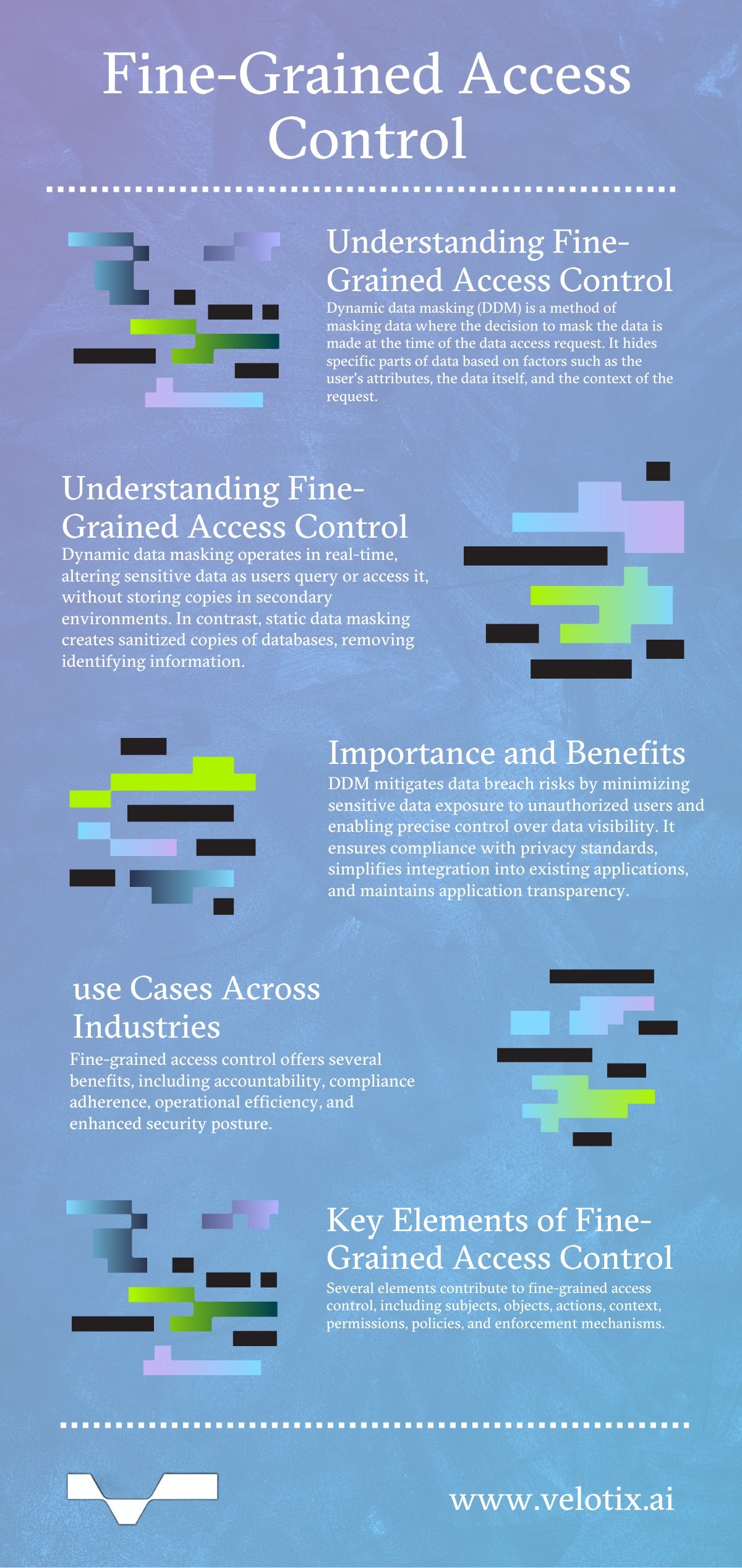What is Fine-Grained Access Control?
Fine-grained access control is the most precise and flexible of all the available access control methods,. It is like other so-called coarse-gran access control systems in that it helps organizations enhance security, compliance, and operational efficiency. But it differs from other controls in that you can tailor it to individual use cases, giving your business a more secure and efficient way to manage data access.
Along with its heightened level of granularity, fine-grained access control is also more flexible, allowing you to grant access based on a precise set of rules such as user identity, desired actions, and type of resource being accessed. You can also define access policies based on a broad and diverse range of factors, including location, time of day, and device type. For instance, you can specify that only users who have spent at least one year with the company can access certain data. Overall, fine-grained access controls allow users to enjoy a more dynamic way to adapt to evolving requirements and circumstances.
Why is Fine-Grained Access Control Important?
Enterprises able to store large amounts of information in one place enjoy an advantage over their competitors. Fine-grained access control allows businesses to save multiple types, sources, and security levels of data in one location while maintaining security and compliance issues. Along with flexibility, advantages to fine-grained access control include:
Accountability: Fine-grained access control helps organizations audit access control and accountability by providing records of who accessed what resources and when. It also assists in identifying and investigating any unauthorized access attempts so businesses can take appropriate action.
Compliance: Many industries have strict regulations governing data privacy and security. Fine-grained access control helps organizations ensure compliance with highly granular control over sensitive data access.
Efficiency: Granting strict user access to only absolutely necessary resources and information improves operational efficiency and helps prevent unnecessary delays and errors caused by granting access to resources that aren’t needed for specific roles or tasks.
Security: By controlling access at a granular level, organizations improve their security postures, ensuring only authorized users have access to sensitive information and resources, and reduce the risk of data breaches and cyber attacks.

Fine-Grained Access Control Use Cases
Fine-grained access control is an excellent method for cloud computing across all industries, as it ensures only authorized users have access to cloud resources. More specific use cases for fine-grained access control include:
Healthcare: Patient data is highly sensitive and must be protected. Fine-grained access control ensures that only authorized users have access to patient records. For instance, instead of granting all doctors, nurses, and support staff access to every patient’s data, data access can be limited to each doctor’s patients.
Financial institutions: Customer account data, financial records, and investment plans are just some of the highly confidential and sensitive data financial institutions collect, store, and access. Fine-grained access control prevents unauthorized access while also ensuring regulatory compliance.
Government agencies: Government agencies and bureaus often have users working remotely or from multiple locations. Fine-grained access control prevents unauthorized access to highly sensitive data like classified documents and national security data.
Insurance: Insurance industries must protect sensitive customer data and ensure regulatory requirements. Fine-grained access control allows companies to limit access by role, such as underwriter, claims adjuster, or customer service rep, some of whom require access to claim information but not financial data or personal contact information.
Manufacturing: As the manufacturing sector becomes more digitized and increasingly integrated, ensuring only authorized users can access production systems and data is vital. Fine-grained access control helps prevent unauthorized access to sensitive data and ensures compliance with security and safety regulations.
Telecom: Fine-grained access can be used to control user access to customer data and network resources like routers, switches, and servers. For instance, you can grant customer service agents access to basic customer information but not credit cards or call records
What are the Elements of Fine-Grained Access Control?
Fine-grained access control is a critical component of modern security strategies. Multiple elements of fine-grained access control work together to improve security, compliance, and operational efficiency.
- Subjects are entities that request access to a resource. Examples include users, processes, and applications.
- Objects are resources subjects access to get the information they need. Examples include files, databases, directories, and network resources.
- Actions like read, write, execute, and delete are the operations a subject wants to perform on objects.
- Context is any additional information used to make access control decisions. It often includes location, time, user role, and device type.
- Permissions are rules that determine whether subjects are permitted to perform specific actions on objects. They can be granted or denied based on user identity, the object a user tries to access, the action being performed, and the context.
- Policies are sets of rules dictating how permissions are given or denied. They can be defined at multiple levels, including system, application, and user, and on the basis of various criteria, including user role, regulatory requirements, and organizational structure.
- Enforcement is used to impose access control policies. It can include mandatory access control (MAC), access control lists (ACLs), and role-based access control (RBAC).
